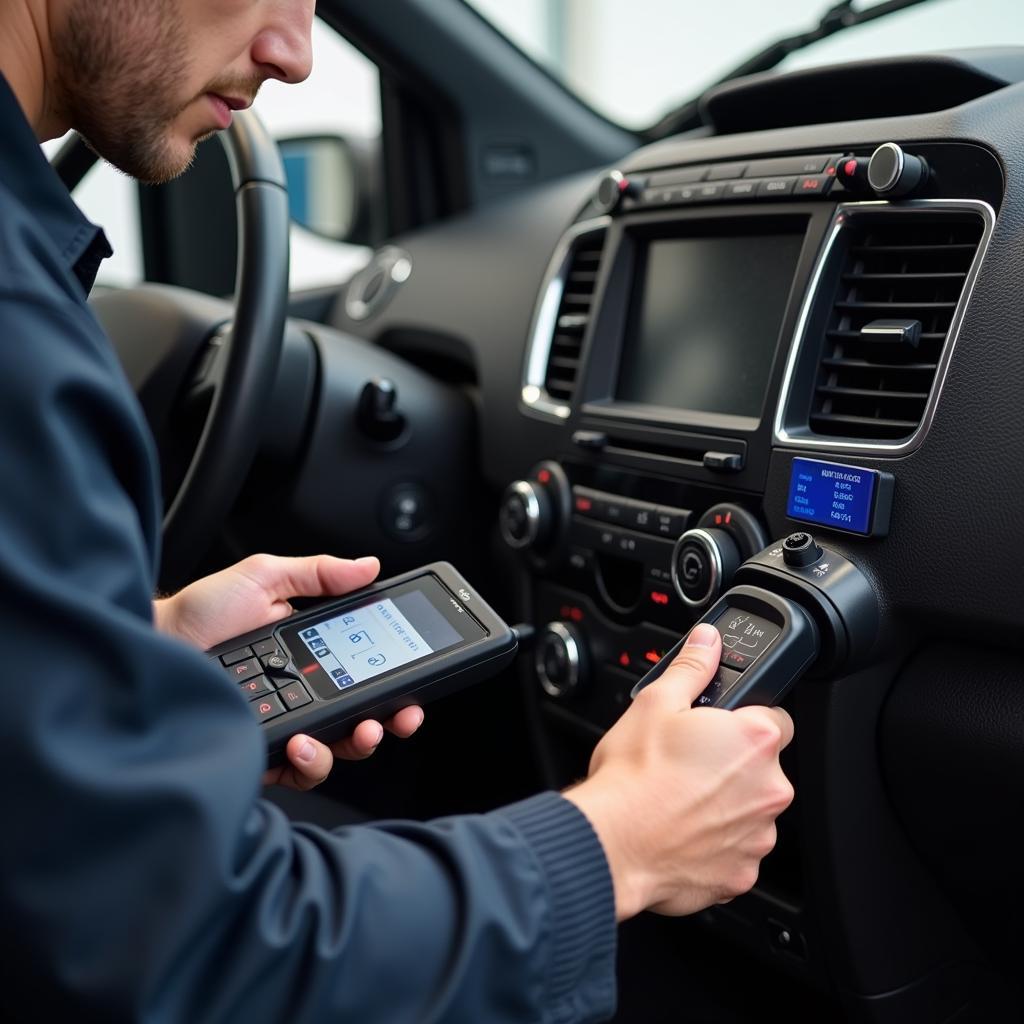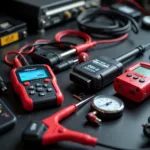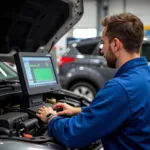A full diagnostic check on your car is like giving your vehicle a comprehensive health checkup. It goes beyond a simple oil change and dives deep into your car’s computer system to identify any potential issues. Whether you’re experiencing warning lights, performance problems, or simply want peace of mind, a full diagnostic check is crucial for maintaining your car’s health and avoiding costly repairs down the line.
What Does a Full Diagnostic Check on a Car Include?
A full diagnostic check on a car utilizes specialized software and equipment to access your vehicle’s onboard computer system. This system, also known as the Engine Control Unit (ECU), acts as the brain of your car, monitoring and controlling various functions. Mechanics use a device called an OBD-II scanner to retrieve Diagnostic Trouble Codes (DTCs) stored in the ECU. These codes act as clues, pointing to specific areas where your car might be experiencing problems.
Here are some key areas covered during a full diagnostic check:
- Engine and Transmission Performance: The mechanic will analyze data related to fuel efficiency, ignition timing, air-fuel mixture, and transmission shifting patterns to identify any irregularities.
- Emissions System: The diagnostic check will assess the functionality of components like the catalytic converter, oxygen sensors, and evaporative emissions system to ensure they are working within acceptable parameters.
- Electronic Systems: From airbags and anti-lock brakes (ABS) to power windows and entertainment systems, the diagnostic check will examine the functionality of various electronic modules in your vehicle.
Why is a Full Diagnostic Check on Car Important?
Many car owners underestimate the importance of a full diagnostic check. They often wait until a visible problem arises, which can lead to more extensive and expensive repairs later on.
Here are compelling reasons why a full diagnostic check on your car is essential:
- Early Detection and Prevention: Imagine being able to address a minor issue before it escalates into a major problem. That’s exactly what a full diagnostic check enables. By identifying potential problems early on, you can prevent costly breakdowns and extend the lifespan of your vehicle.
- Improved Fuel Efficiency: When your car’s engine is running smoothly and all components are working in harmony, it optimizes fuel consumption, saving you money at the pump.
- Enhanced Safety: A full diagnostic check can uncover hidden issues with brakes, airbags, or other safety-critical systems, ensuring your vehicle is in optimal condition to protect you and your passengers.
When Should I Get a Full Diagnostic Check?
While regular maintenance is always recommended, there are specific situations when a full diagnostic check becomes particularly crucial:
- Illuminated Warning Lights: If your check engine light, ABS light, or any other warning light illuminates on your dashboard, it’s a clear sign that your car’s computer system has detected an issue that requires attention.
- Performance Problems: Experiencing rough idling, engine misfires, decreased fuel efficiency, or strange noises? These could be indicators of underlying mechanical or electronic problems that a full diagnostic check can pinpoint.
- Buying a Used Car: Before purchasing a pre-owned vehicle, it’s essential to have a full diagnostic check performed to reveal any hidden problems and provide peace of mind about your investment.
FAQs About Full Diagnostic Checks on Cars
Q: How much does a full diagnostic check on a car cost?
A: The cost can vary depending on your location and the mechanic you choose. However, on average, you can expect to pay between $80 to $150 for a full diagnostic check.
Q: Can I perform a full diagnostic check myself?
A: While basic OBD-II scanners are available for consumer use, they may not provide the same level of detail and accuracy as professional-grade equipment.
Q: How long does a full diagnostic check on a car take?
A: On average, a full diagnostic check can take anywhere from 30 minutes to an hour.
Need Help with a Full Diagnostic Check on Your Car?
Contact us today! We’re here to help you keep your car running smoothly and safely. Our team of expert mechanics is available 24/7 to answer your questions and provide top-notch car diagnostic services. Reach us via WhatsApp: +1(641)206-8880, Email: [email protected].


